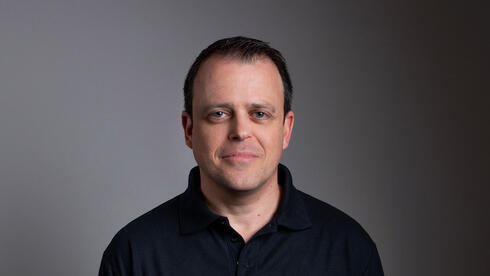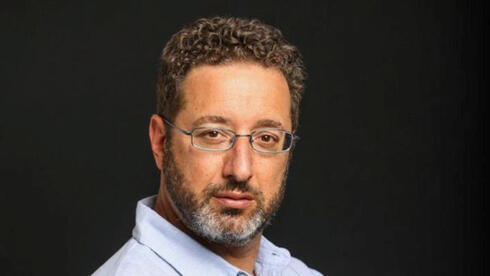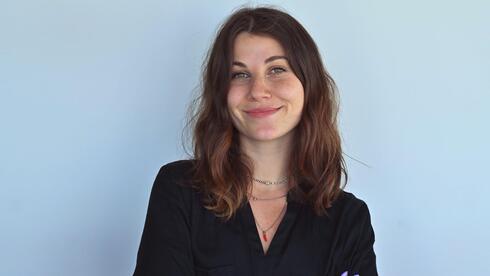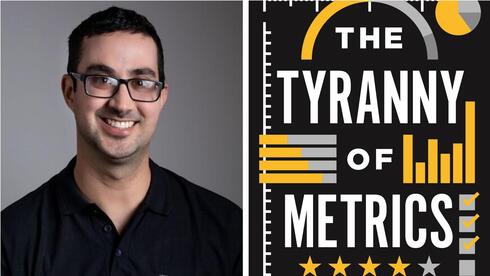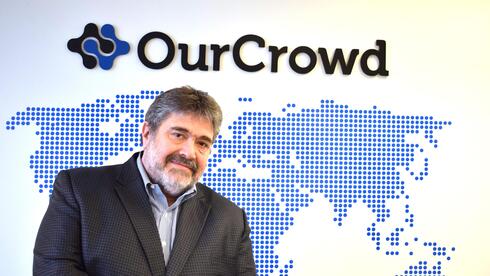
2025 VC SurveyOurCrowd: “Foreign investors continue to bet strong on Israeli tech”
2025 VC Survey
OurCrowd: “Foreign investors continue to bet strong on Israeli tech”
Jon Medved joins CTech to share insights on the view of the Israeli ecosystem from overseas, and what the new year is expected to bring to Startup Nation.
“Despite the wars on many fronts, Israeli tech has been resilient and outperformed expectations,” said Jon Medved, founder and CEO of OurCrowd. Citing data from IVC-LeumiTech’s quarterly survey, he shared how Israeli startups raised $7.22 billion in the first three quarters of 2024, a 32% increase from 2023.
Medved joined CTech for its 2025 VC Survey to share insights on how foreign markets are reacting to Israel’s ongoing war and the impending change of American leadership. Drawing on the sentiments of figures like Elon Musk, Marc Andreessen, Peter Thiel, and David Sacks, he believes there is optimism in the air.
“Foreign investors continue to bet strong on Israeli tech,” he added.
You can catch the whole interview below.
Fund ID
Name of fund/funds: OurCrowd
Total sum of the fund: $2.3 billion under management
Partners: 8
Notable/select portfolio companies (active): Hailo, NeuReality, ThetaRay, CropX, D-ID, HoneyBook, DailyPay, JumpCloud, YuLife.
Notable exits: BioCatch, Innovalve, Lemonade, Beyond Meat, Freightos, Wave, BriefCam, Argus Cyber Security, Kenna Security
2024 is over. How can you summarize it in terms of the Israeli high-tech industry?
Despite the wars on many fronts, Israeli tech has been resilient and outperformed expectations. In the first three quarters of 2024, Israeli startups raised $7.22B, a 32% increase from the same period in 2023, according to IVC-LeumiTech’s quarterly survey. In October-November they raised almost another $1.7B, so overall close to $9B in the first 11 months, compared with $6.9B raised in the entire year of 2023.
Israel has also seen tremendous growth in $100M+ megarounds in 2024, recording 18 from January through November.
Foreign investors continue to bet strong on Israeli tech. Sequoia and Greylock reopened their Israeli offices. Index Ventures has invested $60M in five Israeli startups since the start of the war, and Accel raised a $650M fund in May to invest in Israeli and European startups.
Looking ahead to 2025 - What challenges and opportunities await the Israeli high-tech sector in the coming year, and how are you, as investors, preparing for them?
We expect the global venture community to be much more active in 2025, and VC investing in the Israeli high-tech sector will likely follow suit.
As AI-driven innovations continue to grow, we see opportunities for Israeli tech to play a key role. With the growth of AI, new ways to conserve energy and generate energy from sustainable sources will see an increase in activity worldwide and also in Israel. We expect to see opportunities around energy-efficient data center processing and cooling, as well as opportunities around renewable energy including nuclear energy and grid management.
Two areas in which we expect Israel to excel compared to its global peers are cybersecurity and DefenseTech. Gen AI’s advancements are spawning significant new cyber threats which require a constant flow of new innovations to solve them, and Israeli cybersecurity companies will continue to technology advances to counter the threats. DefenseTech is also evolving into a robust ecosystem with Israeli tech leading the way.
But there will be challenges. As Israel has been at war for over a year, we still expect some challenges around raising new capital for funds and startups. We anticipate that some funding rounds will take longer than in 2022 or most of 2023, but believe we’ll see better timelines than in 2024.
OurCrowd continued to be the most active investor in the Israeli ecosystem in 2024 with some 65 investments including 22 first rounds. We plan to continue this tradition in 2025 with both new and follow-on investments, providing continued support for our Israeli portfolio companies and joining leading entrepreneurs on many new exciting technology business journeys.
How will new American leadership affect the global high-tech industry or economy? And where does this place Israel and its entrepreneurs?
We believe the new American administration will be supportive of the tech industry in general and the VC environment in particular, resulting in a positive effect on the Israeli tech ecosystem.
A very influential group of tech leaders and VC partners including Elon Musk, Marc Andreessen, Peter Thiel, and David Sacks are particularly close to this administration, and this bodes well for the VC asset class.
Some sectors that will see growth are DefenseTech, SpaceTech, and AI, as well as anything to do with energy generation which would enable the US to depend more heavily on its domestic resources and manufacturing.
Israeli tech companies should look into fast-tracking solutions in these industries.
What are the three most important things the Israeli government should do today to accelerate the high-tech engine in the coming year?
- Raise a double-digit billion-dollar national fund for our AI and quantum future
- Incentivize Israeli financial institutions to play a larger role in funding domestic technologies
- Ease regulation and create new programs to encourage new investments for specific target industries for local and international investors
Are there new sectors you see as relevant? Are there any fields you anticipate will weaken significantly in the coming year?
In Israel, DefenseTech is already getting a considerable boost from the war, this includes companies that have adapted their technologies to be used in defense capacities.
I believe that SpaceTech, EnergyTech, embodied AI, and ClimateTech, specifically those that are aiming to redefine common materials with technology, will likely see tailwinds in 2025.
The growing adoption of AI will almost certainly impact service-oriented companies, especially those not using AI as a key component in their technologies.
Sectors that I believe will not grow as fast as others are mobility, cannabis, and AgTech.
Is Israel missing out on the AI revolution in the global arms race? If not, what should the local industry focus on to join the global race?
Far from missing out, Israel is well-recognized as a global AI leader among the top five countries in the world. In fact, according to an SNC report just published in December, there are over 2000 Israel startups working in this important and critical area.
I think that the ability to create new huge companies almost instantaneously will enable Israel to play a bigger role in the global AI revolution, as exemplified by the recent funding round for Safe Superintelligence of Palo Alto and Tel Aviv. This is a great example of raising a billion dollars for a startup with just 10 people reflecting the impact of brilliant entrepreneurship. All I can say is Mazal Tov to the extraordinary Daniel Gross and Ilya Sutskever.
Could the global IPO drought end in the coming year?
Yes, we are praying for this, and it will not come a minute too soon. The closure of the IPO window has created a huge liquidity crisis for LPs and venture funds who must get liquidity in their earlier investments to make more commitments to venture capital funds and startup companies. The amount of time until a company goes public is steadily increasing, now hitting approximately 19 years according to some recent surveys. This is making investors wait too long and their frustration is now being reflected in an unwillingness to make new commitments until they get some of their original money back. Once this window opens ‒ and it will eventually, “speedily in our days” ‒ this will provide significant tailwinds for the venture industry as a whole.
From an investor's perspective: will the coming year be better for early-stage startups or more mature companies?
In 2024, the flight to quality led investors to disproportionately back megarounds and big successful companies which kept on getting bigger and more successful. While these companies will continue to garner much of the spotlight in 2025, I also believe that early-stage companies will see a better year.
Did you raise fund money in 2024 for an existing fund or a new one? What are your expectations regarding this matter for 2025?
OurCrowd raised for several internal funds in 2024. One highlight is the Israel Resilience Fund which deployed funds in over 40 startups and helped unlock more than $100M in new capital for Israeli startups impacted by the war. Another key achievement is our AI fund which is being raised in collaboration with NVIDIA Inception and has already invested in over 15 companies. We also launched a unique bilateral Korea-Israel fund with partners that include the government of Korea and Korea’s third largest banking group, NH, raising an initial investment of $60M which we hope to grow to $200M. We already made our first investment in a unique Israeli company called Kardome which is working with several Korean customers and partners. We have plans to launch additional internal funds in 2025 and expect them to perform well.
How many investments did you make in 2024, and how does it compare to previous years?
In 2024, OurCrowd more than doubled the number of new Israeli and international startups in which we invested: 50 in 2024 up from 24 in 2023. In total, OurCrowd made 108 investments in startups, compared to 91 in 2023. We also backed 11 funds this year, almost the same as 2023 when we invested in 12.
Provide an example of an intriguing investment you made in 2024. What sets this company apart, or what is distinctive about its sector?
OurCrowd invested in ZutaCore this year. The company specializes in direct-to-chip, waterless liquid cooling for AI and high-performance computing (HPC). Its technology cools the hottest AI processors, making them more efficient while consuming up to 50% less energy and taking up to 50% less space. The company signed a significant partnership with Mitsubishi Heavy Industries and others, and we believe it can be a real leader in AI.
Beyond the technology, ZutaCore, headquartered in Sderot, continued operations from a building that came under attack on October 7th, but still experienced a year of unprecedented growth.
Two notable companies that you think will thrive in 2025.
Company Name: Hailo AI
Sector + description of the product/service: AI/Enterprise Hardware – designs chips that enable AI & GenAI on edge devices
Investment amount + total: ~$29.5M OurCrowd investment over five funding rounds
Founding Year: 2017
Reasoning why this is their year: The demand for Hailo’s AI processing chips will continue to grow in 2025, as more companies look to add AI and GenAI as key components to edge devices. The company’s chips are faster, cheaper, and more energy efficient than running AI over servers or the cloud. Hailo hit unicorn status this past year and I believe, for them, the sky’s the limit.
Company Name: HoneyBook
Sector + description of the product/service: Enterprise Software/Fintech
Investment amount + total: ~$16.5M OurCrowd investment over five funding rounds
Founding Year: 2013
Reasoning why this is their year: HoneyBook is about AI supporting small businesses and focused on a comprehensive CRM combining tools for billing, contracts, and client communication. In October, it launched HoneyBook Finance which includes a business checking account and debit card options, payments, cashflow management, and savings tools. Small businesses using Honeybook will now have AI readily available to help accomplish almost anything rapidly and with ease.



